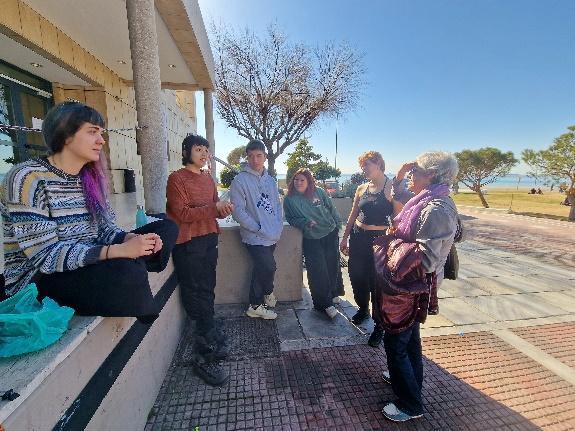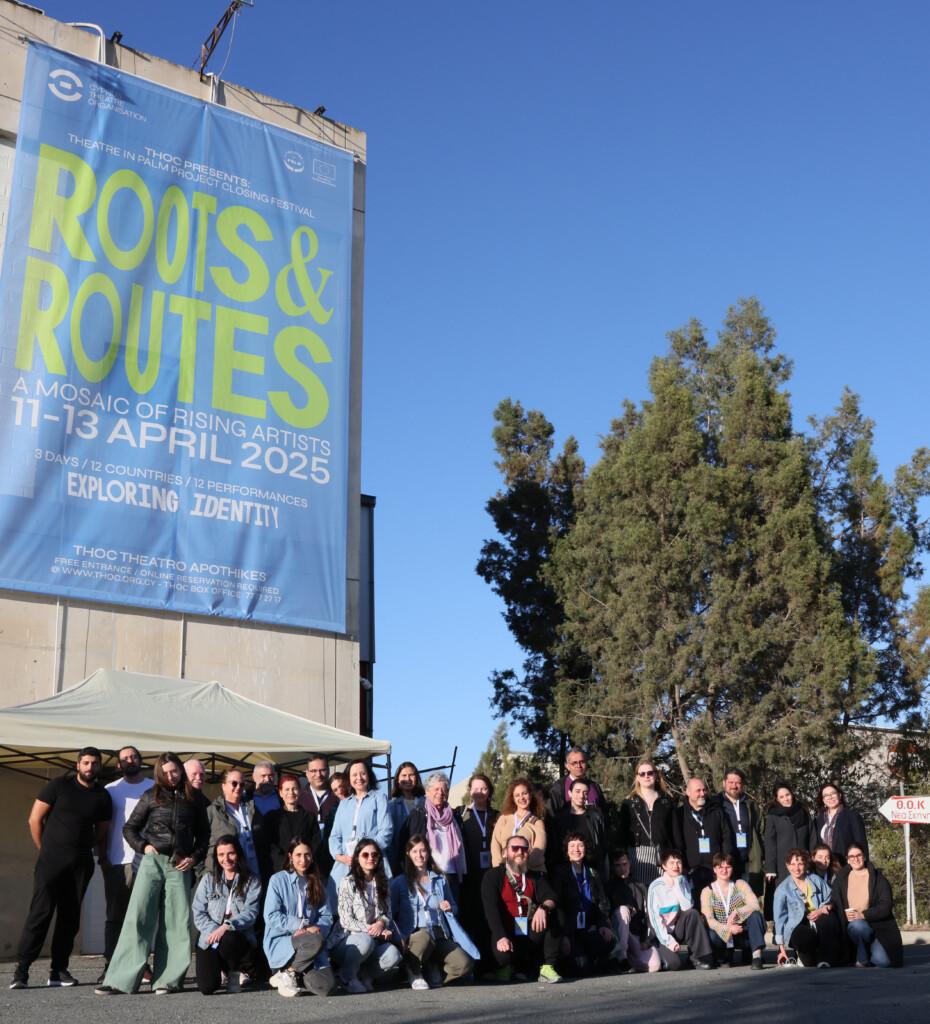Pat Butler’s Journey From Lisbon to Thessaloniki: A Go & See diary

JÁ – CUBE Handshake notes
Pat Butler travelled from JÁ (Lisbon) to Thessaloniki as part of the Go & See programme in early 2023 where she was hosted by CUBE during a period of fervent tumult in the cultural scene in Greece, and here are her raw vivid impressions of art and its fortifications in this ancient Greek city.
Day 1 (Tuesday)
Alexandra
Ministry of Education and Culture has been erratic for a while, with several changes of policy. Education in public universities is free, with subsidised (or free) accommodation and food. Attendance at lectures is compulsory. Until recently, students could stay at university indefinitely, repeating years/courses. There is now a limit of an extra 2 years beyond the normal time.
In private universities, everything is paid by the student, but attendance at courses is not compulsory. Students effectively “buy” their degrees.
Presidential decree (PD) 2022/85 equates 3 or 4 years of study at a public drama school to a high school diploma.
(Alex thought this also applied to graduates of public universities. She had not read the decree.)
Striking students from the drama school (of the national theatre of northern Greece)
Students occupying the Basilico theatre were preparing banners for a demonstration on Thursday against the decree.
All students at the NT drama schools in Athens and Thessaloniki are on strike, and teachers have resigned in protest at the PD. This has never happened before: “Teaching has never before been stopped, not even during the war.”
“The Government wants to move theatre studies to private universities.”
“It is not clear why the Government is doing this now, with an election due in April. It makes no sense.”
“There is no logic to the decision.”
Day 2.
Visit to a theatre that was being occupied. The theatre was closed. There were posters outside with information on the strike, but no one inside.
Visit to the university, which according to Alexandra was being occupied by the theatre students. No sign of any occupation. A. thought this was probably because students were getting ready for exams.
Day 3
Evita
Greece has a problematic democracy. The press is not free. There is no direct censorship, but there is a lot of pressure not to rock the boat, so as not to allow the left parties to regain power.
Minister of Culture has said that there is no justification for the government to pay people for “doing their hobbies”.
This is the starting-point for a wider reform of the cultural sector.
A few years ago, the law was changed to allow companies not to pay actors for rehearsals.
Day 4
Andriana and Marina, graduate and final-year student, resp, of University. Took part in digital residency.
M was aware that the decree only affects employment in the public sector. A thought it also applied to public universities (not private ones). Both thought that it would be used by the private sector as an excuse not to recognise degrees from public institutions.
There is an actors’ union in Greece, but it is difficult to become a member as you have to have had 10 “professional experiences”, ie 10 different paid performances. There is a dramaturgs’ union, but it is not strong. After the decree, The Pan Hellenic Theatre Association was set up. Not yet clear how this will function.
Best-case scenarios:
M: Government loses election. Degree should be recognised. There should be better organisation of the qualifications list, eg when registering as unemployed, you cannot register as an actor. The curriculum of drama schools should be revised.
There should be a system to help new graduates to show their work. (Evita later told me that there are plans to have a fringe at the Thessaloniki festival this year for the first time.)
A: There should be courses in schools at all levels. Salaries should be higher. All directors should work with a dramaturg, and not always the same one. Private drama schools should be allowed to continue, but drama should not be taught in broader private colleges.
Worst-case scenarios:
Government is re-elected. All this will be forgotten. The National Theatre will be privatised. Drama graduates will not be allowed to teach in the public sector.
There will be more private colleges, degree will be worthless. There will be no theatre in Greece. “I would have to leave the country to work.”
Comments of Deputy Minister for Culture and Sports, responsible for contemporary culture.
PD85/2022 regulates the qualifications of all branches for recruitment to positions of an administrative nature in the public sector.
“Despite our great and centuries-old tradition In theatre, dance and music, we have never had university-level studies in the performing arts in Greece. … Without, of course, ignoring the existence of university departments of Theatre and Music Studies, but with a different direction. As well as … the drama schools of the National Theatre and KTHBE, the State Conservatory of Thessaloniki, the State School of Orchestral Art, the School of Dance of the National Opera, … s well as the excellent private schools.
This has nothing to do with the artistic issues – which of course exist – or with remuneration of the artists.
Statement by the Actors’ Union.
The result of yesterday’s meeting with the prime minister was an announcement which will concern the unification in terms of salary and in terms of the grade development of graduates of drama schools and dance schools, regardless of their graduation year (before or after 2003), for the provision of artistic-educational and related work in the public sector. The vagueness of the wording makes any evaluation of it impossible until we see the final legal text, in which every word defines the form of the provision and the legal effects it produces. So, we do not know to what extent it covers our requests, at least for the immediate issue of the withdrawal of our specialties from the PD.
At the same time, the following statement by the prime minister caused us concern: “In any case, with the amendment we have voted for, we have returned to the status quo ante, that is, what was in effect before the publication of the Presidential Decree. So we are at the point that was valid before all this great mobilization on the part of artists took place”. We all know that this is not the case and the amendment not only does not bring us back to where we were before the signing of the DP, but is particularly problematic.
We are continuing our mobilizations, as decided at Monday’s General Assembly and we will evaluate the government’s legislative proposal, while formulating, if necessary, our own counter-proposal in a new extraordinary general assembly that will be held immediately. We are continuing as normal with our strike tomorrow .



